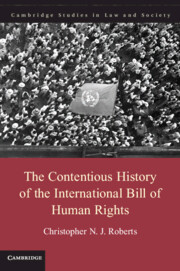Book contents
- Frontmatter
- Contents
- Preface
- Acknowledgments
- Introduction
- Chapter 1 What Are Human Rights and Where Do They Come from?
- Chapter 2 From War and Politics to Human Rights: The Cold War and Colonial Recession
- Chapter 3 Protecting State Sovereignty from the “Dangers” of Human Rights
- Chapter 4 Saving Empire: The Attempt to Create (Non)-Universal Human Rights
- Chapter 5 A Human Rights Treaty that Permits Lynching?
- Chapter 6 The United States’ Unequivocal Ambivalence toward Socioeconomic Rights
- Epilogue
- Index
- References
Epilogue
Published online by Cambridge University Press: 05 November 2014
- Frontmatter
- Contents
- Preface
- Acknowledgments
- Introduction
- Chapter 1 What Are Human Rights and Where Do They Come from?
- Chapter 2 From War and Politics to Human Rights: The Cold War and Colonial Recession
- Chapter 3 Protecting State Sovereignty from the “Dangers” of Human Rights
- Chapter 4 Saving Empire: The Attempt to Create (Non)-Universal Human Rights
- Chapter 5 A Human Rights Treaty that Permits Lynching?
- Chapter 6 The United States’ Unequivocal Ambivalence toward Socioeconomic Rights
- Epilogue
- Index
- References
Summary
After World War II, the structures that protected America’s post–Civil War racial and social hierarchies were in danger of crumbling. The federal government expanded dramatically and the United States plunged itself into international affairs. Yet there were those that wished to preserve the social status quo. Amidst a changing world, proponents of a “traditional” social order were forced to reinvent the arguments about limited government, states’ rights, and isolationism that they had used in the past. During battles over human rights, those that opposed the new social order implied by human rights renewed the rights and duties of the several states vis-à-vis the federal government; they updated the obligations and privileges of US sovereignty in the face of a new communist enemy; they defended the prerogatives of racial supremacy amidst “forced integration from abroad”; and they reasserted the rights and duties associated with a free market.
These struggles over human rights created enduring structures and institutions that served to protect that class of relationships. Between 1951 and 1953 there were at least four Senate resolutions for constitutional amendments restricting the president’s treaty-making powers, motivated by those who, for various reasons, sought to maintain the existing constellation of social relationships. By January of 1953, Senator John Bricker of Ohio – the leader of this movement – announced that he had garnered enough support among his colleagues for one such proposed amendment to pass. A February 1953 State Department memo dryly summed up the situation:
The Covenants are under attack by large and important groups in this country such as the American Bar Association and a number of members of the U.S. Senate. For the administration to press ahead with the Covenants would tend to keep alive and strengthen support for the Bricker amendments to the Constitution.
- Type
- Chapter
- Information
- Publisher: Cambridge University PressPrint publication year: 2014



